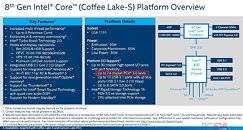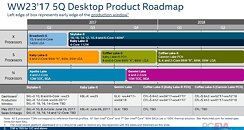- Joined
- Oct 9, 2007
- Messages
- 47,527 (7.48/day)
- Location
- Hyderabad, India
| System Name | RBMK-1000 |
|---|---|
| Processor | AMD Ryzen 7 5700G |
| Motherboard | ASUS ROG Strix B450-E Gaming |
| Cooling | DeepCool Gammax L240 V2 |
| Memory | 2x 8GB G.Skill Sniper X |
| Video Card(s) | Palit GeForce RTX 2080 SUPER GameRock |
| Storage | Western Digital Black NVMe 512GB |
| Display(s) | BenQ 1440p 60 Hz 27-inch |
| Case | Corsair Carbide 100R |
| Audio Device(s) | ASUS SupremeFX S1220A |
| Power Supply | Cooler Master MWE Gold 650W |
| Mouse | ASUS ROG Strix Impact |
| Keyboard | Gamdias Hermes E2 |
| Software | Windows 11 Pro |
Intel seems to be addressing key platform limitations with its 8th generation Core "Coffee Lake" mainstream desktop platform. The first Core i7 and Core i5 "Coffee Lake" processors will launch later this year, alongside motherboards based on the Intel Z370 Express chipset. Leaked company slides detailing this chipset make an interesting revelation, that the chipset itself puts out 24 PCI-Express gen 3.0 lanes, that's not counting the 16 lanes the processor puts out for up to two PEG (PCI-Express Graphics) slots.
The PCI-Express lane budget of "Coffee Lake" platform is a huge step-up from the 8-12 general purpose lanes put out by previous-generation Intel chipsets, and will enable motherboard designers to cram their products with multiple M.2 and U.2 storage options, besides bandwidth-heavy onboard devices such as additional USB 3.1 and Thunderbolt controllers. The chipset itself integrates a multitude of bandwidth-hungry connectivity options. It integrates a 10-port USB 3.1 controller, from which six ports run at 10 Gbps, and four at 5 Gbps.




Other onboard controllers includes a SATA AHCI/RAID controller with six SATA 6 Gbps ports. The platform also introduces PCIe storage options (either an M.2 slot or a U.2 port), which is wired directly to the processor. This is drawing inspiration from AMD AM4 platform, in which an M.2/U.2 option is wired directly to the SoC, besides two SATA 6 Gbps ports. The chipset also integrates a WLAN interface with 802.11ac and Bluetooth 5.0, though we think only the controller logic is integrated, and not the PHY itself (which needs to be isolated for signal integrity).
Intel is also making the biggest change to onboard audio standards since the 15-year old Azalia (HD Audio) specification. The new Intel SmartSound Technology sees the integration of a "quad-core" DSP directly into the chipset, with a reduced-function CODEC sitting elsewhere on the motherboard, probably wired using I2S instead of PCIe (as in the case of Azalia). This could still very much be a software-accelerated technology, where the CPU does the heavy lifting with DA/AD conversion.
According to leaked roadmap slides, Intel will launch its first 8th generation Core "Coffee Lake" processors along with motherboards based on the Z370 chipset within Q3-2017. Mainstream and value variants of this chipset will launch only in 2018.
View at TechPowerUp Main Site
The PCI-Express lane budget of "Coffee Lake" platform is a huge step-up from the 8-12 general purpose lanes put out by previous-generation Intel chipsets, and will enable motherboard designers to cram their products with multiple M.2 and U.2 storage options, besides bandwidth-heavy onboard devices such as additional USB 3.1 and Thunderbolt controllers. The chipset itself integrates a multitude of bandwidth-hungry connectivity options. It integrates a 10-port USB 3.1 controller, from which six ports run at 10 Gbps, and four at 5 Gbps.




Other onboard controllers includes a SATA AHCI/RAID controller with six SATA 6 Gbps ports. The platform also introduces PCIe storage options (either an M.2 slot or a U.2 port), which is wired directly to the processor. This is drawing inspiration from AMD AM4 platform, in which an M.2/U.2 option is wired directly to the SoC, besides two SATA 6 Gbps ports. The chipset also integrates a WLAN interface with 802.11ac and Bluetooth 5.0, though we think only the controller logic is integrated, and not the PHY itself (which needs to be isolated for signal integrity).
Intel is also making the biggest change to onboard audio standards since the 15-year old Azalia (HD Audio) specification. The new Intel SmartSound Technology sees the integration of a "quad-core" DSP directly into the chipset, with a reduced-function CODEC sitting elsewhere on the motherboard, probably wired using I2S instead of PCIe (as in the case of Azalia). This could still very much be a software-accelerated technology, where the CPU does the heavy lifting with DA/AD conversion.
According to leaked roadmap slides, Intel will launch its first 8th generation Core "Coffee Lake" processors along with motherboards based on the Z370 chipset within Q3-2017. Mainstream and value variants of this chipset will launch only in 2018.
View at TechPowerUp Main Site






 (4 subs)
(4 subs)


